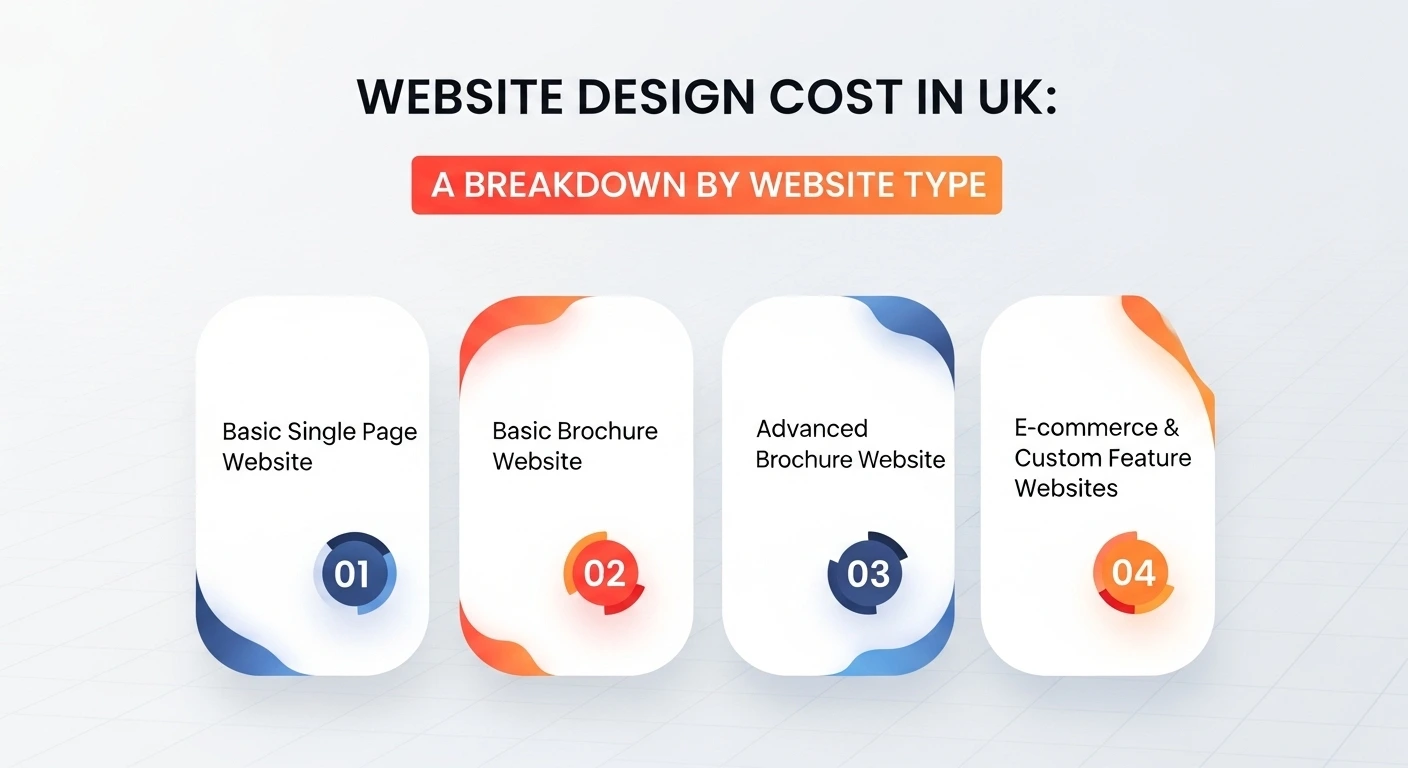Check out
Trusted Ecommerce Website Development Company in UKOne of the biggest issues facing companies preparing for their digital presence in 2026 is the cost of website development UK. Uncertain pricing, unstated costs, and the anxiety of overpaying for services they don’t understand are problems that many business owners face.

Examining elements such as website type, web designer experience, maintenance expenses, and technical infrastructure is necessary to determine the actual cost of website development UK. This guide breaks down every expense to help businesses make informed decisions about their digital investments.
Get a clear, tailored estimate for cost of website development UK project, fast, accurate, and built around your goals
A domain name acts as the digital address at the start of any online presence. Depending on the registrar and extension, the annual cost varies.
While.com domains cost between £7 and £12 per year, popular extensions like.co.uk cost £5 to £15 per year. Depending on demand, premium domains can cost anywhere from hundreds to thousands of dollars.
Files are stored on server space provided by web hosting:
Website security is non-negotiable in 2026. A padlock appears in browsers when data transmission is encrypted by an SSL certificate.
Many web hosting providers include free SSL certificates. For improved validation, paid options range from £30-£150 per year.
Other security features consist of:
Hourly rates for expert web copywriting range from £30-£100. Good content successfully turns visitors into buyers.
The cost of a professional photo session is between £300 and £2,000. Depending on complexity, the cost of producing a video can range from £500 to £5,000.
Alternatives from stock photos start at £10 per month. Although these content updates have a major financial impact, they improve user experience and yield returns.

Typical basic websites have one to five pages with contact information and services. For local service providers and tradespeople, these are ideal.
With hosting included, website builders allow creation for £7 to £50 per month. For custom design work, freelancers charge between £960 and £1,500.
Cost of website development UK for basic sites by digital agencies is £500 to £2,500. Important characteristics include:
Five to twenty pages with improved functionality are necessary for small business websites. Professionals charge between £1,200 and £5,500 for development.
Established companies’ corporate websites range in price from £8,000 to £15,000+. Custom website design and CMS integration are included in the investment.
Essential features include:
Secure inventory management systems and payment gateways are essential for e-commerce websites. Professionally, small online stores cost between £2,000 and £15,500.
Monthly subscriptions to Shopify range from £25 to £320. The development of large-scale platforms that handle thousands of products costs more than £50,000.
Crucial elements consist of:
Unlimited customisation is possible with bespoke websites. For complex applications, development costs can exceed £50,000, with a starting point of around £10,000.
Enterprise platforms necessitate long timelines and committed teams. Advanced features consist of:
Get a modern, high-performance website tailored to your goals and built to convert.
Coding is no longer necessary with website builders. Drag-and-drop interfaces are available on platforms such as WordPress.com and Wix.
Web hosting and SSL certificates are included in monthly fees that range from £7 to £50. Benefits include quick deployment and no requirement for technical expertise.
Platform dependence and limited customisation are among the drawbacks. As businesses expand, scalability issues may surface.
Direct communication and individualised service are provided by freelancers. Depending on experience, rates range from £30-£100 per hour.
Hourly rates for London freelancers range from £80 to £150. The hourly rate for regional developers in Birmingham and Manchester ranges from £60 to £120.
Benefits include more flexible scheduling and reduced expenses. Single points of failure and capacity limitations present difficulties.
Web development companies offer full-service teams. Digital agencies charge between £50 and £200 per hour, and their projects can cost between £2,500 and £10,000.
Benefits of the agency include:
Increased expenses are a reflection of overhead and a range of skills. Results provide expert quality supported by well-established reputations.
Navigation and visual identity are established by UI/UX design. For comprehensive work, professional designers charge between £600 and £3,200.
Costs are greatly impacted by design complexity. While custom design commands premium pricing, simple customisation requires little financial outlay.
Optimising the user experience guarantees that visitors can easily achieve their objectives. Conversion rates and customer satisfaction are directly impacted by this.
Designs are turned into useful interfaces through front-end development. Depending on complexity, prices range from £800 to £10,000.
It is standard practice to use responsive design on all devices. While more expensive, advanced features like animations improve user engagement.
Databases and server logic are handled by back-end development. Depending on the needs, development expenses can range from £3,200 to £10,000.
Booking systems and other custom features need a lot of programming. A well-planned database avoids costly future reorganisations.
Non-technical updates are enabled by content management systems. With over 40% of the global market, WordPress is the industry leader.
Professional WordPress setup fees range from £100-£1,500. While plugins increase functionality, premium themes range in price from £50-£200.
Different strengths are offered by alternative platforms, such as Drupal. Long-term maintenance costs are impacted by the CMS selection.
Maintaining a website guarantees its functionality and security. Depending on complexity, maintenance expenses range from £50-£500 per month on average.
Backups, security monitoring, and software updates are examples of services. Maintenance neglect results in ranking drops and security threats.
Crucial task consist of:
Search visibility is increased through SEO optimisation. The monthly cost of expert SEO services ranges from £500 to £5,000.
One-time basic audits cost between £500 and £2,000. Local SEO makes it more affordable for small businesses to show up in location searches.
SEO is only one aspect of digital marketing. Budget allocation for Google Ads must take competition into account.
The monthly cost of social media marketing ranges from £500 to £5,000. Platforms for email marketing range in price from £10 to £300 per month and offer a high return on investment.
| Website Type | DIY Builder (Annual) | Freelancer (One-time) | Agency (One-time) |
|---|---|---|---|
| Basic Website (1-5 pages) | £84-£600 | £960-£1,500 | £500-£2,500 |
| Small Business (5-15 pages) | £108-£516 | £1,200-£5,500 | £2,500-£10,000 |
| Ecommerce Store (Small-Medium) | £300-£3,840 | £2,000-£15,500 | £5,000-£40,000 |
| Bespoke Platform (Enterprise) | Not Available | £10,000-£50,000+ | £10,000-£100,000+ |
The most costly market is London. Higher operating costs are reflected in the £80–£150 hourly rates charged by digital agencies.
In London, freelancers make between £60 and £100 per hour. Cutting-edge knowledge and a distinguished brand experience are provided by premium pricing.
Prices for website development are competitive in Manchester, Birmingham, and Leeds. The hourly rate for web designers ranges from £60 to £120.
While preserving quality, regional markets offer outstanding value. Regardless of location, remote work increases access to talent.
The cost of website development UK is affected by development timelines. Freelancers and agencies charge more for urgent projects.
Websites for small businesses typically take 4–8 weeks to complete. Custom websites take three to six months, whereas e-commerce platforms take eight to sixteen weeks.
The quickest deployment time is a few days with website builders. Compared to custom development, speed has limitations in terms of customisation.
Feature lists have a big impact on costs. Platforms that demand accounts and payments are more expensive than basic websites.
Each custom feature costs between £500 and £5,000. Connecting external services through API integrations costs between £500 and £3,000.
Website templates offer affordable places to start. Custom design produces distinctive visual identities that are highly valued.
Timeliness and budget are impacted by striking a balance between fully custom website design and template customisation. Many opt for middle-ground strategies.
WordPress provides free plugins, but the premium versions cost between £30-£200 a year. Several high-end plugins are necessary for e-commerce websites.
Expenses mount up over multiple extensions. Improved functionality makes advanced features worth the investment.
Although stock photography is inexpensive, it lacks originality. It costs between £300 and £2,000 to hire a professional photographer to create unique content.
The cost of producing a video can range from £500 to £5,000. Each piece of custom graphics that distinguish brands costs between £50-£500.
Content investment includes:
In addition to hosting, modern websites need other services. Security, analytics, and email platforms result in ongoing monthly expenses.
While self-hosted solutions require separate subscriptions, website builders come with services. Expenses can easily add up to £300 per month.
Depending on location and experience, website developers can make between £25,000 and £55,000 a year. In large cities, senior developers with expertise in in-demand technologies make over £70,000.
The cost of website development UK can range from £500 for simple builder sites to over £50,000 for sophisticated platforms. Professionals typically charge between £2,500 and £10k for small business websites.
Website development is capitalised by businesses as an intangible asset that depreciates over three to five years. Continuous upkeep is included in the annual operating expenses. For compliance, speak with accountants.
Future developers enrol in self-directed learning programs, computer science degrees, or coding boot camps. Creating skill-demonstrating portfolios is beneficial. As technology advances, ongoing education is still crucial.
Depending on the requirements, development methodology, and quality levels, cost of website development UK can vary significantly. Businesses are better equipped to make decisions that match investments with goals and financial constraints when they have a thorough understanding of these factors.
Affordability and long-term value are balanced in successful projects. In the end, sacrificing security, responsive design, or user experience results in missed opportunities that cost more. Instead of concentrating only on initial costs, smart planning takes into account total ownership, including hosting, maintenance, and marketing.